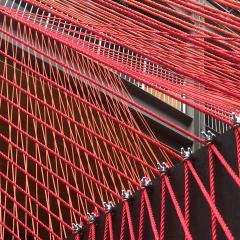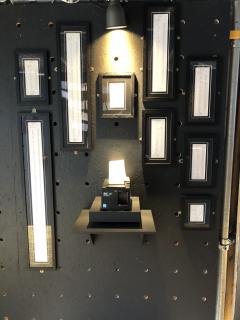A Data Play-Ground
The Design Informatics Pavilion is a public pop-up exhibition space featuring a range of objects and experiences that invite you to step into the future. We took a tour of the exhibition with Jane Macdonald, Research & Projects Coordinator for Design Informatics, to get the lowdown.

Situated in the courtyard outside the Bayes Centre – the University’s Data-Driven Innovation Hub, hosted by the College of Science and Engineering - is the Design Informatics Pavilion. The black container looks as if it has tumbled from the building above and become trapped within a web of bright red ropes, creating a striking visual display. Although climbing the structure is strictly forbidden, the interior offers an alternative type of playground. Mixing design and technology with interactive display, the free exhibition explores a number of themes aimed to provoke discussion on what it means to “design with data” in highly accessible ways.
Featuring work from the research centre, Design Informatics Masters students and Tesco Bank, the exhibition showcases eight very different projects. {poem}.py is a collection from Dr Pip Thornton, a post-doctoral research associate in Design Informatics at the University, which explores Google’s commodification of language through its search and advertising platforms. The project lists popular poems, songs and mottos by itemising each mentioned word on a receipt, ascribing Google’s price value to each word and calculating the total cost at the bottom. There is everything from ‘Sunshine on Leith’ by The Proclaimers and ‘Daffodils’ by William Wordsworth to Tesco’s ‘Every Little Helps’ motto. On the floor, lies a pile of discarded receipts for you to take away as a memento – The Hollow Man by T.S.Eliot costs £202.74.

Ironically Tesco Bank’s collaboration with Design Informatics sits next to Thornton’s critique of linguistic capitalism. This is the second year of collaboration between the two on their Project Mercury, with their app creation, Playful, exploring how technology can improve financial well-being. A potential piece of good news for financially irresponsible students, Playful is designed to manage how we spend, save and manage money. You can set alerts to encourage financial restraint - for example, needing a parental figure to approve every spend you make or setting a warning to prevent you from over-spending on new clothes.
Within such a small space, there is a lot to explore. Wheesht! by MSc student Siyao Zhou presents a record player that ‘plays’ silence to encourage the appreciation of silence in a noisy world. Karma Kettles simulates a context of distributed energy generation that informs users when it is best to use their kettle based on usage in the surrounding area, illustrating on and off-peak times and prices. GeoPact explores new urban transport and delivery solutions using smart contracts. You can follow the on-screen instructions to try and unlock the box using location data and then reap the rewards of the treasure inside.
If you find yourself wandering past the Inspace building from 9pm in the evening until 4am in the morning, their windows facing onto Crichton Street will be displaying exhibits into the night. There will be a selection of Experimental Al video pieces curated by Drew Hemment from artist Jake Elwes. Dr Pip Thornton will be projecting the entirety of George Orwell’s 1984 in receipt form across the festival – with three chapters shown every evening. To get further involved, there are several free events taking place across August that extend on the Data Play exhibits. Visit designinformatics.org/event for more details.
The Data Play: Design Informatics Pavilion is part of the Summer of Art within the Edinburgh College of Art for the Edinburgh Festival Fringe. It will be on display from the 2 August - 26 August from 11am to 6pm in the Bayes Centre Courtyard, 47 Potterrow, EH8 9BT and is free to visit.
https://www.eca.ed.ac.uk/summer
https://www.designinformatics.org/research_project/data-play-festival-2019/

